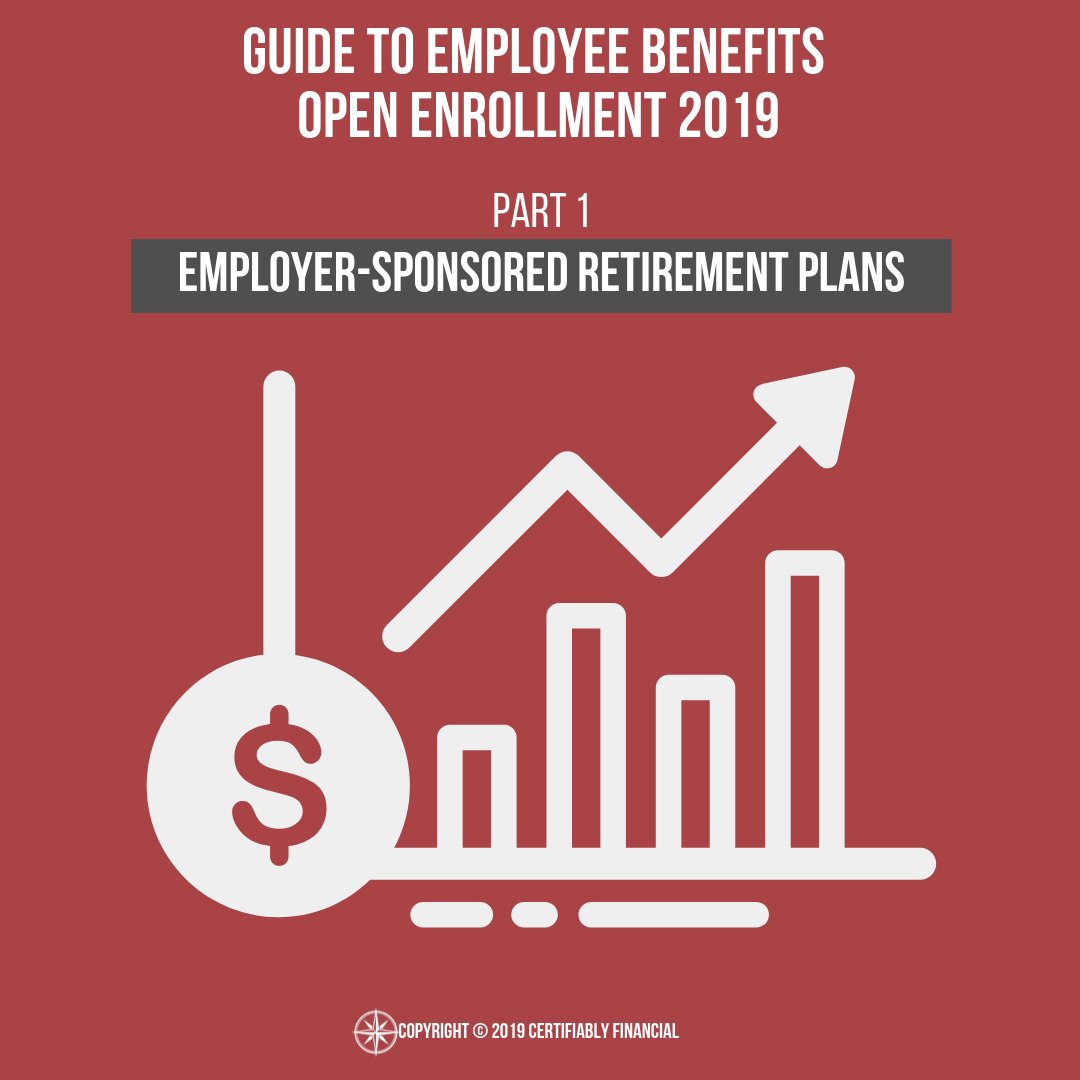This is part 1 of a series where I’ll be providing general education on many of the employee benefits elections that you’ll be faced with during open enrollment season. While there are some employers whose employee benefits open enrollment has already closed, many companies don’t have open enrollment until October or November. I find that many people take their best guess at making their enrollment elections, but have never really been well-educated on the decisions that they have in front of them or what might be best for their personal situation and don’t necessarily understand everything that they’re opting into or out of. Something that can make this even more confusing is having a spouse who’s employed at a company that provides benefits and trying to figure out how each employer’s benefits can work together for you. I’m hoping that this series of posts can help provide some education around some of the common benefits offered by employers and help people make better decisions for what might be best for their personal situation.
Invest
Savings As A % Of Income
A client recently emailed me letting me know that she got a new job with a significant raise. She wanted help with selecting her employee benefits and said that she was going to contribute enough money to her 401(k) to make sure that she received the employer matching contribution, but she mentioned that she remembered that last year’s financial plan showed that she needed to contribute a higher percentage of her income, although it was at a much lower salary.
IRA
Since I wrote about 401(k)s earlier this week, I figured I’d write about IRAs today. Not everyone has a job that provides an employer-sponsored retirement plan such as a 401(k). When this is the case, an IRA can often be a good alternative to start with to save for retirement.
401(k)
The other day, someone asked me how I feel about 401(k)s. They told me that they weren’t sure about them and that they wanted to invest riskier but they hate not being able to touch it for so many years.
Details Matter
4 minute read
I’m passionate about financial planning because it’s a profession that allows me to put my skills to work helping others in an area of life that most people can use help. Although I know I stray from this line of thought often, I was raised to always try to put others first and think of them before considering my own wants and needs. Unfortunately, it seems that there are many others in the financial services industry who consider their own wants and needs before thinking of their clients.
Don’t Be Left In The Dark
The reason I’m writing this is due to two separate situations that I’ve been made aware of recently. One of the situations is something that someone I work with discovered when combing through a new client’s information from their previous financial advisor and one is something that a friend found when exploring a new client’s financial information from a former advisor. Both show how easy it is for investors to be left in the dark if they’re not working with someone trustworthy.
The first situation that I mentioned above is something that my boss found when reviewing a new client’s Indiana CollegeChoice 529 Savings Plans that were setup for them by a financial advisor who works for a financial services firm with a household name. It’s great that the clients have these plans in place and are already saving for college for their young children, but this was an “Advisor” plan rather than a “Direct” plan. This means that the financial advisor set up the plan for the clients and managed the investments within the plan rather than the client setting up the plan themselves and choosing the investments.
The clients were being charged 4.75% on every single deposit they made into the accounts, and that was after receiving a discount from the 5.5% othey were being charged prior to account hitting a certain balance. What a deal.
That’s insane. They had no idea.
This is something that we don’t even charge for at the company that I work at because there isn’t very much value that we can add to managing 529s. We help clients setup a “Direct” account and tell them which investment to choose. There’s not a whole lot more to a 529 than that although the example above seems to indicate that there are other financial services firms that think so.
Free Account
The second situation is one that one of my friends came across when reviewing information for a prospective client. The client’s current financial advisor told her that her account is free with no annual fee. (Remember our discussion about free above?)
Notice how the message was framed to her. “The account is free with no annual fee.”
Technically, she isn’t paying an annual fee for the account. What she is paying is the up to 5.75% up-front commission on all of the mutual funds she purchases within the account in addition to the ongoing expense ratios on the mutual funds, one of which is 5.5%. Most are at least 1.2%.
I can imagine where most of the money being made off of that “free” account is going.
Know Who You’re Working With
Just because your friend or family member got a new job as a financial advisor where they’re required to sell products and they start with pitching them to their friends and family doesn’t mean that you have to, or should, work with them. Isn’t it kind of scary how easy it is for someone with no financial experience to get a position like that which could have significance long-term consequences on those they’re selling to?
I’m very fortunate to have a degree in financial planning and to have learned about all aspects of the financial services industry. Most who work within the industry haven’t been fortunate enough to experience this type of education and be exposed to all the different sides of the industry and how each is compensated.
I believe that some people who are selling these awful financial products to others genuinely believe that they’re doing a great job helping them and that they’re doing something good for the client. I think a lot of financial salespeople don’t even know that there’s another side of the industry and that there’s an option to always work as a fiduciary in the client’s best interest. They’ve simply been told that they have an opportunity for a solid job with high income potential and that’s the extent of their knowledge on the industry.
Unfortunately, there are those who know about all sides of the industry and know that there are better options for their clients but are more motivated by continuing to line their own pockets. Oftentimes people who works at these types of firms are simply salespeople who passed basic level securities exams to keep them out of prison, not educate them on financial planning. Many have no background or previous experience in finance or financial planning. It may be harsh, but it’s true.
Eliminate Conflicts of Interest
Stories like those above demonstrate exactly why I chose to work at a fee-only, independent RIA and not sell products or be paid on commission. Commission-based advisors inherently operate under a conflict of interest. No matter what product is best for your situation, they’re incentivized to sell you the one that makes them the most money, pays their mortgage, and feeds their family.
Maybe now you’re even more paranoid to work with a financial planner because of these stories. Or (hopefully) you’re more motivated to audit your current financial professional’s recommendations and the things that you’ve implemented in your own financial life. Either way, here are some things that you can do to help make sure that you’re working with someone who is obligated to always work in your best interest. I’ll repeat a few of them below.
- Work with a CFP professional
- Work with a NAPFA-Registered Financial Advisor
- Ask them if they act as a fiduciary for you at all times
Where Should I Setup a Retirement Account?
3 minute read
There are so many options where you can open an account and so many advertisements from companies telling you why they’re the best to use. A Roth IRA is a Roth IRA; there isn’t an advantage from one account to another. The advantage comes from the assets that you’re able to invest in within the account.
Luckily for those looking to open a retirement account (or any other investment account), the large investment companies continue to compete and drive each other’s prices down.
Do It Yourself
There are plenty of custodians with reputable names where you can open an investment account: Schwab, Vanguard, TD Ameritrade, Fidelity, etc. I don’t know all of the specific offerings that each company has, so I’m going to explain more of the general things to look for when determining where you should open an investment account.
Fees
Fees are always one of the top things we need to consider when investing. Why? They are one of the fastest ways to eat up our returns. Which institution you choose to open your account at doesn’t make much of a difference – the assets that the company makes available to you are going to have a much greater impact on your investing success.
You want to make sure that the company that you choose to setup your investment account with provides you with access to good mutual funds and ETFs that have good long-term performance and low fees. Fees can include trading fees charged by the institution where your account in setup, loads on mutual funds, and expense ratios that the mutual funds charge on an ongoing basis.
As mentioned above, the good thing for retail investors is that these companies continue to drive each other’s prices down. In fact, Schwab now offers no-load, no transaction fee mutual funds to retail investors. One thing to keep in mind is that there may be account minimums or monthly contribution minimums that these companies require to open an account and access these funds and low fees. Additionally, you want to make sure that the expense ratio on the mutual funds isn’t high to make up for not charging a load or transaction fee.
However, there are some companies where you can setup an investment account that only allow you to invest in their own mutual funds and ETFs. In general, this should be a no-go. These companies typically charge very high expense ratios and their investments often under perform their benchmarks. Conversely, those companies that I mentioned by name above (this is not an all-inclusive list) allow account holders to choose from the (almost) full universe of mutual funds and ETFs. This means that you can pick the very best investments available, even if they are from a competitor of the company where you have your account.
Custodians for Financial Planners
I work at a fee-only Registered Investment Advisor (RIA) that uses Schwab as a custodian. A custodian is important because it means that we never have control of our clients’ money. Instead, we setup accounts at Schwab for our clients, in their names, which provides us with limited power of attorney to trade their accounts and send money between like-named accounts (i.e. transfer money between their checking account and investment account).
If you decide that you would like to work with a financial planner, they will likely have their preferred custodian where they will ask you to house your assets. Financial planners have chosen custodians because it makes their jobs easier and their clients’ lives easier. The planners are provided with a service team with the custodian, they know all of the processes and procedures to complete various tasks with the custodian, and client accounts are in one place which makes life much easier than if they were scattered amongst various clients’ preferred investment companies.
In addition to working with an experienced advisor, there are additional advantages to opening an account with a financial planner compared to opening a retail account on your own such as more favorable share classes available as well as different mutual fund families that aren’t available to the public.
Please keep in mind that the only check you should ever write to your financial planner is to pay your fees. You should never write a check directly to your financial planner for an account deposit – deposits will always be made out to the custodian for benefit of you with your account number on the payment.
Conclusion
Overall, where you open an investment or retirement account doesn’t make a huge difference. The things that you want to be aware of are the investment choices available to you, the fees that you’ll incur, and the level of service you believe you’ll receive.
Should I Pay Down Debt or Invest The Money?
4 minute read
Sometimes, the decision of whether to pay off debt more aggressively or to invest more is an emotional decision rather than a mathematical one. Some people really hate having debt and it keeps them up at night thinking about owing someone else money. If debt bothers you this badly, and you’re in a position to do so, then paying off debt more quickly than required may not be a bad option.
However, there’s a more mathematically optimal way to approach the situation. But it doesn’t really matter if you take the mathematically optimal approach if you can’t feel comfortable with it. If you’re fortunate enough to be in a position to make either choice and remain financially secure, then you have to feel comfortable and secure with your decision. Otherwise, you’ll just keep thinking about it.
Time Value of Money
The concept of the time value of money must be taken into consideration to understand the mathematically optimal decision. It’s better to have (or invest) a dollar today than it is to receive (or invest) a dollar at some point in the future due to the potential that the money has to earn a compounding rate of return.
While money that you invest is expected to compound (earn returns on previous returns or earn interest on previous interest), debt amortizes which means that the balance decreases with each payment. Under an amortization schedule, outstanding interest is paid first and outstanding principal is paid with what’s left of the payment. Interest is calculated on the most recent balance of the loan which means that the amount you’re paying in interest decreases with each payment.
Let’s take a look at an example where you have two options:
Option 1
Smart Investing is Boring
3 minute read
The US equity bull market being “boring” has proven this. The S&P 500 has gained nearly 300% since March 2009 (when the market bottomed) and over 9% year-to-date. Who wouldn’t want something boring that could produce those results? You didn’t have to do anything to receive these outcomes besides buy a S&P 500 mutual fund or ETF. Easy, effective, boring.
If this isn’t enough evidence for you that smart investing is boring, then there are a few more facts to help drive the point home that boring is good. The S&P Dow Jones Indices 2017 Year-End SPIVA US Scorecard states that less than 8% of large-cap mutual fund managers, a little over 5% of mid-cap mutual fund managers, and a little over 4% of small-cap mutual fund managers beat their benchmarks over the preceding 15-year period.
Let’s state that another way for perspective; most large-cap managers (over 92%), mid-cap managers (nearly 95%), and small-cap managers (nearly 96%) failed to beat their benchmarks over the 15-year period ending December 31, 2017.
These are the smartest, most well-educated professionals in the industry with the best technology and research available to them. If they can’t do it, then why would anyone else think they could? For some reason, despite the glaringly apparent evidence, people (even those without the MBA, PhD, and advanced trading technology and research) still think that they can do better than indexing.
The Advantage of Boring
If you didn’t allow your investments to ride and be “boring”, then you may have sold at any one of the “major” market events (according to the media) of the past 8+ years: the Flash Crash in 2010, the BP oil spill in 2010, the US debt downgrade in 2011, the Eurozone double-dip recession in 2012, the Taper Tantrum in 2013, the Ebola epidemic in 2014, the Chinese stock market turbulence in 2015 and 2016, the Royal Bank of Scotland making an announcement to sell everything in 2016.
All of the events mentioned above were made out to be huge news items at the time that were expected to have significant negative impacts on the US equity markets. That’s a lot of negative news to get scared about. However, the market has continued to chug along through all of these blips and selling at any of these times would have meant missing out on significant market gains.
One of the biggest robbers of potential portfolio returns from investors is allowing market noise to make them sell and then them being afraid to get back in.
A Disciplined Approach
Just remember, historically, the market goes up most of the time. (Of course, historical performance is not indicative of future performance – gotta keep the compliance people happy). A disciplined investment approach of maintaining a diversified portfolio based on your personal goals and comprehensive financial plan may be “boring” but provides superior results to trying to time the market in the long-run.
If boring works, then why waste your money trying to beat it?
Here’s what you can do create a boring, but effective, portfolio:
- “Pay yourself first” by setting up automatic contributions to your retirement accounts before you ever spend any of the money.
- Setup the account(s) mentioned above so that it automatically invests your contributions in a diversified portfolio of mutual funds and ETFs based on your goals and risk tolerance.
- Monitor your investments and rebalance your portfolio using steadfast rules while not letting market noise from the media affect your decisions
- Increase your savings rate each time you receive a raise or bonus.
- Find something else to do with your time rather than listen to/watch the media try to scare you into oblivion.
The Grass Is Always Greener
3 minute read
That isn’t to say that we should stop our periodic investing through payroll contributions or automatic contributions from a bank account. Dollar-cost averaging, as it’s known in the finance world, allows us to diversify buying in between low points and high points and is a great way to weather the market as it runs its cycle.
I get it. These clients see the market continue to climb higher (although it hasn’t broken through the high it set January 26), and they probably hear the financial media “experts” telling them about how great the market is right now. They feel like they’re missing out.
But, many of these clients are the same people whose sole focus was on not losing any money in the market last year and two years ago. They had to be persuaded to take as much stock market risk as they did (although it’s an appropriate amount of risk for their situations) because they were leery of losing their money. Now, maybe they think, “What if I had put all of my money in stocks? I’d have made a killing!” Yeah, but what if you did have all your money in the stock market? There’s no guarantee that any of that money would be there tomorrow.
The grass is always greener.
One of the biggest value-adds that financial planners provide to clients is maintaining an objective view in times like this. Rather than arbitrarily trade client portfolios, and invest them more aggressively, we implement an investment process which is based on each individual’s financial plan. Without first having the financial plan, we wouldn’t have a very good idea of how a client’s assets should be invested.
The financial plan is the road map while the investments are one of the components of the car that are going to help us get to our destination. We’re not going to take a different route just because we think the scenery would be more beautiful when in reality it could dramatically lengthen our trip. We’re going to stay the course because our analysis shows that it’s going to get us to where we need to go in the most efficient manner possible and allow us to reach out goals.
We know that the market and the economy are strong, based on economic factors, and we know that it has done well since 2009. However, past performance is not indicative of future performance. When people first become clients, we agree to a portfolio allocation for them based on factors such as their goals, age, and risk tolerance, among other things. Typically, client portfolios become more conservative as they age and near retirement.
But it has been clients who are nearing, or are in, retirement who have been asking about adding more risk to their portfolios. However, the same can be said for younger investors – we shouldn’t add more risk to our portfolios just because we see the market climbing and we’re afraid of missing out. We should remain diligent and dedicated to our financial plan and not forget that it’s based on our own personal risk tolerances.
Don’t let the allure of what you don’t have get derail the plan that you’ve set forth to reach your goals.
Do You Know The Differences Between a Financial Planner and a Financial Salesperson?
4 minute read
Fee-Only Financial Planner
I’m a fee-only financial planner and I do not sell products. I’m a CERTIFIED FINANCIAL PLANNER™ professional (all caps is a CFP Board requirement, I’m not yelling at you) which means that I completed The Four E’s as outlined by the CFP Board:
- Education – I have an undergraduate degree in financial planning.
- Examination – I’ve passed a comprehensive exam that covers the financial planning process including
- Tax planning
- Employee benefits and retirement planning
- Estate planning
- Investment management
- Insurance
Experience – I have several years of experience working under someone who is a CFP® professional (the minimum is 2 years)
Ethics – I uphold the CFP Board’s Standards of Professional Conduct and I act as a fiduciary.Most professionals who are CERTIFIED FINANCIAL PLANNER™ professionals have the job title of “financial planner” rather than other job titles such as those mentioned above.
I work for an independent Registered Investment Advisor (RIA) which charges clients a fee that is based on their assets under management (AUM). In other words, the size of their portfolio that Market Street manages. I don’t make commissions because I don’t sell products. I don’t sell products because my company doesn’t have any products to sell and because selling products to someone is a very suboptimal way to approach financial planning. We’re simply paid a fee by our clients to create a financial plan for them (which is updated at least annually), invest their assets in accordance with the plan, and help them with anything that they need along their life’s journey.
Financial Salesperson
When I was in college and I started looking for financial planning internships I knew I wanted to work with a fee-only firm. The main problem that I see with the model of financial salespeople who are paid based on commissions is that they’re incentivized to do what is in their best interest, not yours.
I’m sure that you, or someone you know, has been approached by someone who wants to sell you whole life insurance, an annuity, or some other financial product that you didn’t really understand (run away!). The questions that I ask myself in this situation are, “How can someone tell you that they have a great product to sell you when they’ve not done a deep dive into your financial situation and your goals and aspirations. Don’t they need that information first to even know if what they’re selling you is right for you?”
For example, let’s say that a financial salesperson tells you that you need product A. However, they also have option B available that would actually be better for your situation. If this person is paid based on commissions, and product A pays them a better commission than product B, then you’re likely never going to hear anything about product B.
Does this seem right to you?
In fact, many large financial services organizations that operate under this structure sued the Department of Labor over its Fiduciary Rule because they didn’t want to have to act in your best interest when selling you something.
If you haven’t been approached by someone wanting to sell you a financial product, then I’m willing to bet that at some point a financial services company has tried to recruit you to work for them. Think about your current occupation for a second. Would your employer ask you to recruit me, who has no training or technical knowledge in your area of work, to come and do your job?
In my opinion, a better way to do things is to complete the financial planning process first, including writing down your goals and aspirations, which will provide you with a better understanding of how you should invest your money. Most of the time this doesn’t involve purchasing financial products such as whole life insurance or annuities.
Work With Someone Who Always Has Your Best Interest First
Fee-only financial planners are only ever paid the fees that clients pay to them. No product selling. No commissions. No referral incentives. (There is a different between fee-only and fee-based). The intention of the fee-only model is to eliminate conflicts of interest and to always put the client’s best interest first. No matter what. I got into the financial planning profession as a means to help others and the fee-only model is the model that I believe in and stand by.
Of course, not all commission-based financial advisors are bad and not all fee-only financial planners are good. If you have questions about your financial life or have been considering working with a financial planner, then I would recommend utilizing the CFP Board’s website to find a fee-only financial planner who is a CFP® professional and will always work in your best interest: http://www.letsmakeaplan.org/.










